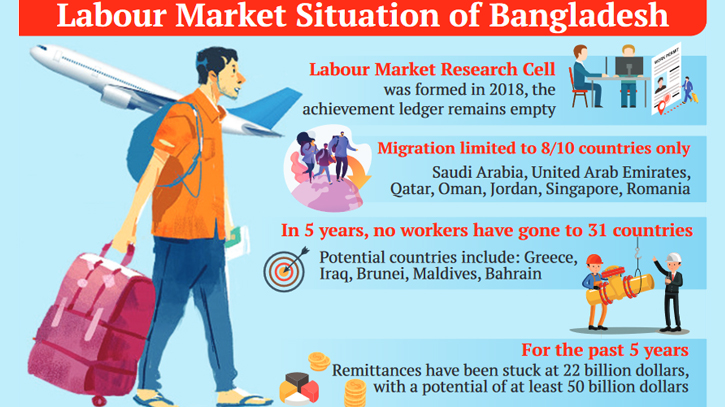
Photo : Messenger
The Prime Minister has repeatedly urged concerned parties to seek new labour markets outside the country and suggested establishing a research cell for this purpose. In 2018, following the Prime Minister's directive, a special labour market research cell was formed to explore employment opportunities for Bangladeshi workers in 53 new countries. However, after seven years, there has been no significant progress, and not a single labour market has been established. Instead, labour markets in Malaysia, Kuwait, Brunei, Maldives, and Mauritius have closed. Recruitment of Bangladeshi workers has also stopped in several countries, including South Korea, Romania, Qatar, Jordan, and Singapore.
On May 31, 2023, Bangladesh signed a G2G agreement with Kuwait to recruit skilled manpower, including nurses and technicians, creating employment opportunities for 50,000 workers annually. However, bureaucratic and visa complications, syndicates, and high immigration costs threaten this potential market.
Shah Abdul Tariq, Additional Director General of BMET, acknowledged that the creation of new markets is not entirely halted but noted that progress is slower than expected.
He said, "Since I came here, I have been trying to ensure that our people can reach their destination country without any harassment."
In response to a question, he mentioned, "There is pressure from the Prime Minister's Office on this issue. We, the ministry, are working in that light. We are taking initiatives to enhance the activities of the research cell."
According to related sources, remittances are not increasing due to the lack of alternative labour markets. Remittances have been stagnant at $22 billion for the past five years, with regular movement of workers limited to only 8 to 10 countries. Experts attribute this to the lack of infrastructure for research and skilled manpower. Meanwhile, irregular migration is on the rise as alternative labour markets are not being created.
About 1.6 million workers have gone to Saudi Arabia in the last three years, adding to the 1.5 million already there. In the financial year 2020-21, remittances from Saudi Arabia reached $5.7 billion. Despite the influx of new workers, remittances have dropped to $3.7 billion over the past three years, resulting in a decrease of $2 billion in expatriate income. This indicates that although more workers are going to the Middle East, remittances are not increasing proportionally.
There is a significant demand for workers in developed countries, including Europe and Japan. However, the government is struggling to send skilled workers to meet this demand because nearly 50 percent of the country's workforce is unskilled. The number of workers legally moving to Europe under bilateral agreements and MoUs is very small.
In 2018, BMET conducted research on the possibility of sending workers to the labour markets of 53 countries. Despite this research, workers are only being sent to these countries in small numbers.
According to the organization, the total number of expatriate workers exceeds 15 million. Of these, 55 percent are in Saudi Arabia. In comparison, Italy hosts 0.50 percent, and the UK 0.13 percent. The remainder work in the Middle East and other Southeast Asian countries.
Immigration expert Asif Munier highlights that irregular migration is increasing due to the stagnant labour market expansion. He stated, "If necessary, seasonal labourers should go every year, work in a specific season, and return. For this, we need a permanent settlement, either governmental or private. Without it, the labour market sector, despite its potential, may collapse."
Munier emphasised the need for regular research, noting that no permanent arrangements or research cells have been established.
Consequently, workers spend more and rely on brokers to go to different countries, creating opportunities for traffickers to exploit the situation.
Shariful Hasan, Associate Director of the Migration and Youth Platform at BRAC, commented, "In countries where there is a high demand for foreign workers, we are unable to produce skilled workers that meet their standards. If we could anticipate the types of workers needed in Saudi Arabia and Japan over the next decade and prepare our workforce accordingly, we would be better positioned."
Hasan emphasised the necessity of mandatory technical training, noting, "A large part of our population is young, while Europe has a higher proportion of elderly people. In 30 years, this demographic opportunity will no longer exist. Sending skilled workers abroad will not only meet this demand but also increase remittances."
Ali Haider Chowdhury, General Secretary of the Bangladesh Association of International Recruiting Agencies (Baira), has raised concerns that no joint working committee meetings on the labour market have been held since 2022. He emphasised that the activities of the research cell are limited to paperwork.
Chowdhury highlighted the importance of convening the Joint Working Committee, stating, the research cell was formed due to the Prime Minister's good intention. However, there is no substantial work being done by this research cell.
“Instead, we face complications in sending workers to various countries, and some nations are even stopping the import of manpower from us. Immediate intervention from the highest levels of government is necessary."
Even though labour markets are closing one after another, the Ministry of Expatriates' Welfare and Overseas Employment is not taking action. The labour market research cell has been inactive for seven years, and no joint working committee meetings have been held since 2022. This is the complaint of Baira General Secretary Ali Haider Chowdhury.
Immigration analyst Dr. Kudrat e Khuda Babu commented on the situation, stating that the lack of communication and coordination with foreign missions regarding the closed and stagnant labour markets is to blame. "If the market is not expanded, the country's immigration sector will face disaster. Technical institutions are not working to create skilled manpower, and labour diplomacy lacks effective planning," he said.
He emphasised that to expand the labour market abroad, our missions in the respective countries should be active and strengthen labour diplomacy. They fear that the immigration sector of the country will face disaster if the new market is not expanded.
Economist Dr. Mahfuz Kabir expressed his concerns, stating, "The cell was created, but it is not functioning. It is very sad. Such cells are very active in other countries. Our neighbouring countries, especially India and Sri Lanka, analyse the labour market system and advise their governments accordingly. They develop their manpower based on that research. We are not able to exploit that opportunity due to a lack of research outcomes."
According to BMET, Bangladeshi workers are working in 168 countries worldwide. Out of these, 31 countries have not had any workers in the last five years, and regular workers go to only 8 to 10 countries.
Messenger/Fameema








